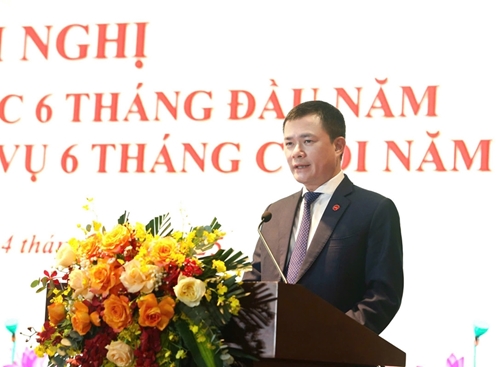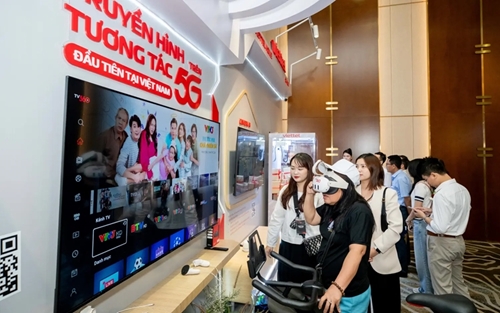The proposal was made at the Ministry’s mid-year conference. At the event, Gen. Thang emphasized Viettel’s determination to research, master strategic technologies, and accelerate the national innovation progress.
Nine strategic technology groups
According to Gen. Thang, the Politburo’s Resolution No.57 has created strong momentum for national development in the new phase, placing breakthroughs in science, technology, and innovation as a fundamental driver. A key focus is to achieve breakthroughs in the development and mastery of strategic technologies to enhance national technological capacity, competitiveness, socio-economic development, and ensure defense and security.
    |
 |
|
Maj. Gen. Tao Duc Thang speaks at the event. |
In June 2025, the MoST gave suggestions to the Prime Minister to issue Decision No.1311/QD-TTg, identifying 11 strategic technology groups, a vital foundation to guide businesses in investment, research, and technology application aligned with the national development strategy.
Aiming to become a global technology corporation, Viettel has been pro-actively implementing strategic research programs, investing heavily in high-quality human resources and research-production infrastructure to master strategic technologies.
To date, the group is actively engaged in nine out of the 11 strategic technology groups listed in the Prime Minister’s Decision.
Accordingly, in artificial intelligence (AI), digital twins, virtual/augmented reality group, Viettel has developed Vietnamese large language models, virtual assistants, and digital twin solutions for smart cities. In the group of cloud computing, quantum technology, big data, the group has built large-scale data centers and cloud services and has been researching directions for quantum technology products and services.
In blockchain technology, it has assessed the feasibility of developing blockchain-based platforms, including digital asset exchanges and State Bank digital currency aligned with state policy. Attentively, in the next-generation mobile networks (5G/6G) group, the group has been researching and developing a full ecosystem of 5G and 5G-Advanced products. In terms of robotics and automation, it has been developing humanoid and autonomous robots, including AGV robots already successfully deployed in Viettel Post’s logistics operations.
In semiconductor technology, Viettel has concentrated on designing chips for 5G-Advanced/6G transceivers, secure chips, and edge processing chips. Regarding advanced materials and energy technologies, the military group has launched research on advanced material processing for aerospace applications and developing large-capacity energy storage systems.
Notably, in cybersecurity, Viettel has been providing security solutions for key infrastructure, such as Viettel SOC Platform and Viettel Anti-DdoS which have been already deployed for government agencies and major enterprises. And in aerospace technology, it has been doing research on low-orbit satellites and dual-use unmanned aerial vehicles.
Proposals to accelerate strategic technology development
To attract global talents back to Vietnam, Gen. Thang emphasized the need for comprehensive and effective mechanisms and policies. Viettel proposed that the State allow experts to own or co-own research outcomes, patents, and inventions, and hold ownership stakes or shares in enterprises formed from research results.
This proposal aligns with Vietnam’s Law on Science, Technology, and Innovation, which stipulates that individuals directly creating scientific and technological results hold authorship rights, while those providing financial contributions hold ownership rights.
Gen. Thang confirmed that Viettel aims to attract at least 50 experts to work for the group.
    |
 |
|
Interactive TV platform on Viettel’s 5G infrastructure |
Viettel also proposed a mechanism in which the State invests, and enterprises operate key laboratories, metrology, and testing facilities for evaluating strategic technology products. This is similar to Viettel’s proposal under the semiconductor chip manufacturing plant project, which will be reported to the Government to develop Vietnam’s semiconductor ecosystem.
Gen. Thang also gave the fact that over the past five years, Viettel has implemented the Viettel Digital Talent program, annually selecting about 500 students for internships. Many have won national and international awards. Therefore, according to him, to strengthen the link between businesses and universities while expanding knowledge and practical experience for students, Viettel proposes a mechanism to recognize internships at enterprises as academic credits within training programs.
Translated by Mai Huong